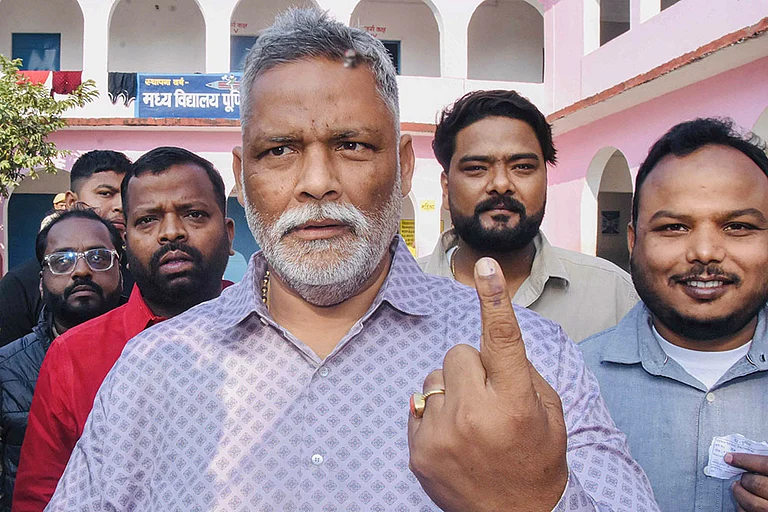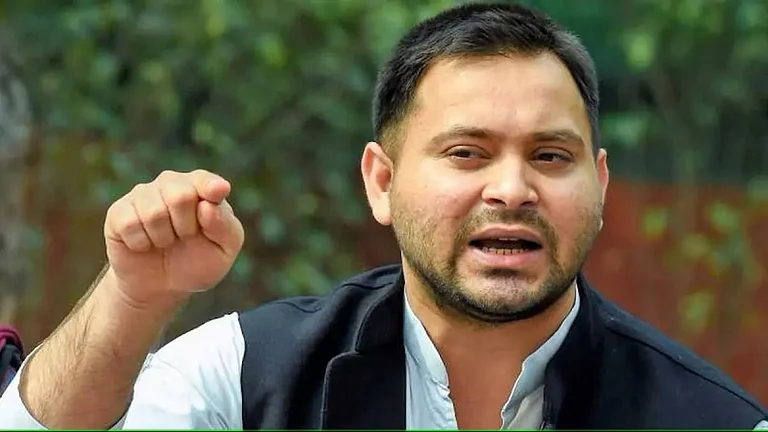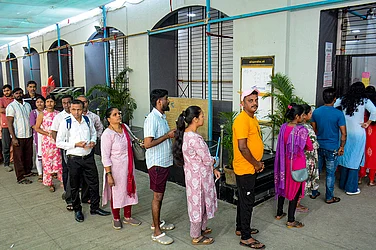
The murder of Vikassheel Insaan Party functionary Kameshwar Sahani, hours after Nitish Kumar’s return as chief minister, has triggered allegations of political conspiracy and scrutiny of Bihar’s law-and-order record.
Opposition leaders brand the situation “Afsar raj” and “Maha Jungle Raj”, accusing the government of shielding crime-accused ministers and enabling a climate of impunity.
The ruling NDA counters that crime has fallen compared with the 1990s and vows swift justice, even as residents recount rising thefts and sense of worsening law and order.
At 6 AM on a Friday, a man was washing his hands outside his home in East Champaran. The calm, pre-winter mornings in rural Bihar have quiet beginnings.
On this particular morning in Tinkoni village, less than 24 hours after ‘Sushashan babu’ Nitish Kumar was sworn in as the tenth-time chief minister of Bihar, the calm was broken by gunshots as Kameshwar Sahani, 50, Vikassheel Insaan Party’s district in-charge for Chauradano in East Champaran, was allegedly killed by two gunmen. Sahani was influential in the area’s fishing community and very active politically as a member of VIP – an ally of the opposition Mahagathbandhan.
The early morning murder, which has rocked the district and raised questions about the state of law and order, is being probed under the supervision of Raxaul SDPO.
As expected in any killing of a political leader, a ‘conspiracy’ charge is being levelled by his party.
Founder of the Vikassheel Insaan Party, Mukesh Sahni, is already claiming this is a political murder. “I knew him, of course. He was a diligent worker. This is a political murder, by the real ‘jungle raj'," he claims while bringing up one of the most used phrases of this election campaign.
This election saw a historic, one-sided mandate in favour of the incumbents. With Nitish Kumar as the face of Vikas in Bihar, the BJP and JD(U) frequently reminded Biharis of the dreaded ‘jungle raj’ period.
At a campaign rally on October 25, Prime Minister Narendra Modi hailed Nitish Kumar as ‘Sushashan Babu’—a leader of good governance—and announced he would again be the chief ministerial candidate. Modi promised that the “jungle raj” of the 1990s would give way to “Sushashan raj,” despite Kumar having governed Bihar for the past 15 years, either in alliance with the BJP or previously with the RJD.
The message clearly resonated with voters. The National Democratic Alliance won 202 of the state’s 243 seats, leaving the opposition—Congress, RJD, several Left parties, and VIP—routed. VIP, which had captured five seats in 2020, failed to win a single seat in 2025.
VIP leader Mukhesh Sahni refused to accept the results. “This isn’t a public mandate; it’s a murder of democracy,” he said. Speaking about the recent killing of a colleague, he added, “Criminals are fearless now. Nitish ji isn’t entirely mentally present. I don’t blame him; it comes with age.” Sahni claims that Kumar relies heavily on IAS and IPS officers for daily decisions, creating what he calls a new “jungle raj”.
He argues that politicians answer to the public and can be replaced, but bureaucrats, with a retirement age of 60, act without accountability. He suggests that mental fitness tests should be required for public office. Sahni also contends that the opposition had a mandate, noting the Muslim-Yadav votebank constitutes just 18 per cent of the electorate, yet the opposition performed better, and that the NDA’s victory margin was only 5 cent.
Concerns about safety have intensified following recent crimes. A rice mill owner in a nearby village lamented that no one feels secure. On the murdered colleague, Sahni said the party would meet the DGP on November 24, but made no mention of financial support for the widow and three children, only that party workers “will help when needed.”
Discussions of Bihar’s crime scene inevitably include Anant Singh, the Bahubali of Mokama. Immune to prosecution, his influence remains undiminished, delivering victories for whichever party he aligns with. Sahni accuses the BJP and JD(U) of encouraging criminals by protecting figures like Singh—a fact widely acknowledged and almost proverbial in the state.
So Ali Anwar, former Rajya Sabha MP who is now associated with Congress, brings up the state’s new Home Minister. “BJP has become blatant. Look at who they gave Home to; a man accused of murder and worse, can you expect justice from a government like this?” he asks, pointing fingers at the new Home Minister Samrat Choudhary. In September, Jan Suraaj founder Prashant Kishore demanded Choudhary’s arrest, who was the deputy chief minister at the time, in a 1995 murder case.
Anwar repeats the charge and claims, “I feel sorry for Nitish’s helplessness. I can understand why he was forced to give Home to a man like that; he must be under BJP pressure. Look at their choices, Samrat and Magal Pandey, are they not ashamed to have criminals for ministers?” Pandey, who has been awarded by the Health Ministry once again, was at the centre of several controversies related to alleged mismanagement during the COVID-19 pandemic. Have crimes risen significantly or decreased? On this question, the answer is that of a 60-year-old woman whose house is merely 2 kilometres away from the chief minister’s residence.
In a supposedly affluent area of Patna, she was on a morning walk with her servant when two youths on a motorbike stopped them and pressed guns to their foreheads. It was barely 5:30 a.m. in July, and the boys appeared no older than fifteen or sixteen. They scratched her throat with jagged nails while trying to snatch her gold chain, worth around ₹1 lakh. Shaken to her core, she is simply grateful to have survived.
She now says almost every woman in her neighbourhood has experienced similar thefts. Many have stopped wearing real gold in public, calling it an epidemic.
Ali Anwar blames the media for abandoning the term “Jungle Raj” and labels the situation “Maha Jungle Raj”. He predicts no justice will follow, even if the murder under investigation proves politically motivated, as it will likely be dismissed as a personal dispute. He adds that ministers and MLAs facing criminal charges embolden offenders. A former reporter in Bihar during the 1990s, Anwar says Union Minister Lallan Singh threatening voters before the 2025 elections was one of the worst crimes, worse than the 90s Jungle Raj. “Anant Singh was once part of the RJD. Both are the same — sheltering criminals is the norm,” he says. He claims robberies and murders occur daily, but under the BJP government, public concern has faded.
BJP spokesperson Guru Prakash Paswan dismisses these claims. “Ali Anwar is senior to me, and I respect him, but this is incorrect. Only a court can declare someone a criminal,” he states. On the “Maha Jungle Raj” allegation, he points to statistics: “Can anyone honestly say crime is worse than during Lalu’s rule? Nitish-ji never compromises on crime or communalism, and authorities will ensure justice for the victim.”
His view is echoed by Deepak Mishra, a Patna estate agent and BJP supporter. “I lived through the old regime — it was terror,” he says. “You couldn’t step out after 7 p.m. The Lalu family turned the city into a nightmare. Crime exists today, but it is far lower and criminals are fearful. Even earlier governments were corrupt, but the sense of lawlessness was unparalleled.”
Mishra acknowledges that corruption remains endemic. “Nothing moves without a bribe. Block-level corruption rivals, if not exceeds, that of the Lalu era. Police verifications, licences, tenders — all demand cash. People have come to accept it as inevitable.”
He places hope in the appointment of Samrat Choudhary as Home Minister. “With BJP in charge of Home, Samrat will tackle crime decisively. Criminals will think twice; there will be encounters to ensure law and order,” he says.



























